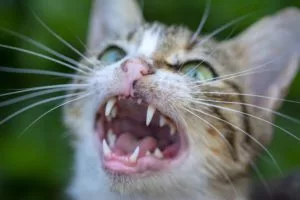Cats often chatter their teeth when they are in pursuit of another animal, such as a bird that is outside singing and chirping. Your cat sees that bird as dinner and stalks them as they are wide-eyed and staring intently from the window sill. Cats will sometimes also chatter to communicate with us.
You can help your cat explore their predatory nature by playing with them on a regular basis. If you want to know more about why cats’ teeth chatter, check out this pawsome article.
What is Feline Teeth Chattering?
Chattering is your cat’s adorable way of letting you know that they want that sweet little songbird clutched between their paws. Chattering can be alarming to see and hear when your beloved feline is hunting from the windowsill. It sounds something like a chirp or a trill.
When a cat is chattering, they appear to be moving their jaw up and down in a fast-paced motion. Chattering results in a sequence of short noises followed by short gaps between sounds. There are common reasons why your cat’s teeth are chattering. The following may be some possibilities:
Chattering Mimics the Kill Bite
Many cat parents have witnessed the sight of their little hunter exercising their jaw in anticipation of the bite they want to take out of their unsuspecting victim. It may sound cruel, but it is a part of nature, and it is in their instincts to want to hunt. Yes, even your gorgeous, strictly indoor Persian cat has these instincts.
Your cat is practicing what they will do to their prey when they catch it. The killing bite occurs when the cat jumps up and catches their prey, holds it in their claws, and bites the neck and head using the lower jaw. Horrific and sad, the chattering is their way of practicing this violent act. They are simply mimicking what they wish they could do.
Chattering Mimics Their Prey
Much research has inferred that chattering is part of what a wild cat does to mimic their prey, trying to fool it into thinking they are one of them. For example, a cat may imitate a monkey in the wild, so the monkey believes it is just another monkey trying to communicate.
Research from the Wildlife Conservation Society suggests this. Cats can be wild and cunning creatures. It has been suspected that the wild cat in the rainforest chatters to lure their dinner to come to them. It may be one of the chief reasons the house cat chatters at birds.
Chattering is Indicative of Excitement
There is no doubt that when your cat sees a bird, a squirrel, or something they want to catch or chase, they will get excited. Excitement is one of the common reasons why cats chatter. You can read the cat’s body language to tell for certain. Some of the tell ‘tail’ signs your cat is excited include:
- Enlarged, dilated pupils
- Ears shifted forward
- Whiskers forward
- Loose and relaxed body posture
- A head that is up high
- An upright tail
If you see any above body language displayed in conjunction with chattering, know your cat is excited. They probably see a bird or squirrel outside that they want to pursue. When your cat sees prey, they get a rush of adrenaline, and it excites them. Your cat may even chatter while chasing a toy bird or mouse.
Chattering Due to Frustration
Similar to dangling a carrot in front of a rabbit just out of their reach, if your cat is stalking their prey through the window, they can look but not touch. Your cat will become increasingly frustrated due to not being able to capture the bird or whatever animal they are fixated on. Your cat may exhibit some of the following body language when they are focused on a target:
- Eyes big with narrowed pupils
- Body low to the ground
- Crouching posture
- Whiskers forward
- Tail twitching
- Back arched
You may also notice that your feisty feline looks ready to pounce. The feline may start to chatter if they cannot get to their prey. There is, after all, a window pane blocking them from accomplishing their goal. Your cat has a lot of pent-up energy and frustration, which is how they express themselves.
Chattering to Communicate
Sometimes cats will chatter at their humans during playtime. Your cat gets excited and wants to communicate that to you. Certain cat breeds can be highly vocal and may chatter to get your attention. Chattering is also a means for mother cats to talk with her kittens. By chattering, your cat may feel that you belong to them.
Chattering May Signify Dental Issues
Your cat may be chattering due to pain in their gums or teeth. The chattering will often occur when your cat eats or grooms themselves. The pain is triggered by pain from the root of the tooth. Chattering is a common sign of discomfort in cats with resorptive tooth lesions. Other indicators of dental issues include:
- Loss of appetite or attraction to food
- Chewing more slowly than usual
- Pain when the mouth area is touched
- Pawing at the mouth
Your cat may also move food around their mouth without chewing, drop food from their mouth, or smack their lips. If your cat is chattering and you see any of the above signs, it is time to take them to the vet, as they may be experiencing severe or debilitating dental pain.
How to Satisfy Your Cat’s Predatory Instincts

Playtime
The best way to satisfy your cat’s inner hunter is to play with them on a regular basis. This way, they will not feel so deprived if they cannot get their paws on that enticing little robin or song sparrow. It is also mentally and physically rewarding for them. Cats love a good teaser toy with a little mouse or feathers at the end. During play, prevent frustration in your cat by letting them catch the toy after a while.
Food Scavenger Hunt
Hiding treats all around the house is a terrific way to get your cats’ feline mojo running and their brain active and prepared for fun. They will love searching for their reward, and the two of you will share some good bonding time. It will appeal to their wild side and thrill them when they find their treats. It will also help improve their mental and physical health.
Clicker Training
Clicker training is awesome to help your cat act out their predatory inclinations and is a good bonding tool. It teaches your furry friend different tricks and behaviors. The clicker helps develop their confidence and works well for positive reinforcement, stimulating your cat’s body and mind.
Conclusion
A cat’s teeth may chatter for various reasons. Most of the time, it is due to their predatory nature. Your feline companion may be frustrated that they cannot go outside and hunt as their instincts drive them. You can help your cat by playing with them daily and ensuring they avoid mischief.
Do you have any questions about your cat’s teeth chattering? Our staff at Tuder Vet Group would be glad to help! With over 75 years of experience, we have locations in Bayonne, Hoboken, and Jersey City, NJ.

